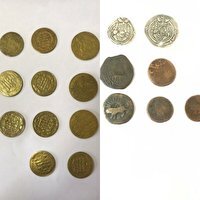Iranian police arrest suspected smuggler, seize ancient coins

TEHRAN – Iranian police forces have arrested a person suspected of smuggling ancient artifacts and recovered seven ancient coins.
The lawbreaker was traced and finally arrested at his place in the city of Kashan after the authorities received reports from cultural heritage aficionados, Kashan tourism chief Mehran Sarmadian said, IRIB reported.
“Of the 18 coins discovered, 11 are counterfeit and seven-date from the historical and Islamic eras,” the official said.
About 220 CE the Sasanian dynasty of Iran introduced the concept of thin flan coins. The Muslim conquest of Persia, also known as the Arab conquest of Iran, led to the fall of the Sasanian Empire of Iran (Persia) in ca. 651 and the eventual decline of the Zoroastrian religion. The rise of Muslims coincided with an unprecedented political, social, economic, and military weakness in Persia.
The conquering Muslims at first mimicked the coinage of their predecessors. In the western provinces, they issued gold and copper pieces imitated from contemporary Byzantine coins, modifying the cross on the reverse of the latter somewhat to suit Muslim sensibilities. In the eastern provinces, the Arab governors issued silver dirhams that were copies of late Sasanian coins (mostly of those of Khosrow II; with the addition of short Arabic inscriptions on the margin and often the name of the Arab governor in Pahlavi; even the crude representation of the fire altar was retained.
AFM
Leave a Comment